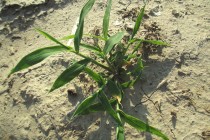👤Angus Catchot, Extension Entomologist
🕔12:37, 19.Feb 2013
Sugarcane beetles (Euetheola humilis rugiceps), have caused many Mississippi corn producers major headaches in the last decade. Ironically enough, most of the problem areas are in the Hill region of the state and not the Delta region. Sugarcane beetles are certainly present in the Delta but rarely cause widespread problems in corn (to date). Sugarcane beetle infestations are sporadic in nature but heavy infestations can be very serious and require replanting in some situations. Unfortunately there are no viable rescue treatments available, so this pest has to be managed at planting.
Read Full Article▸



